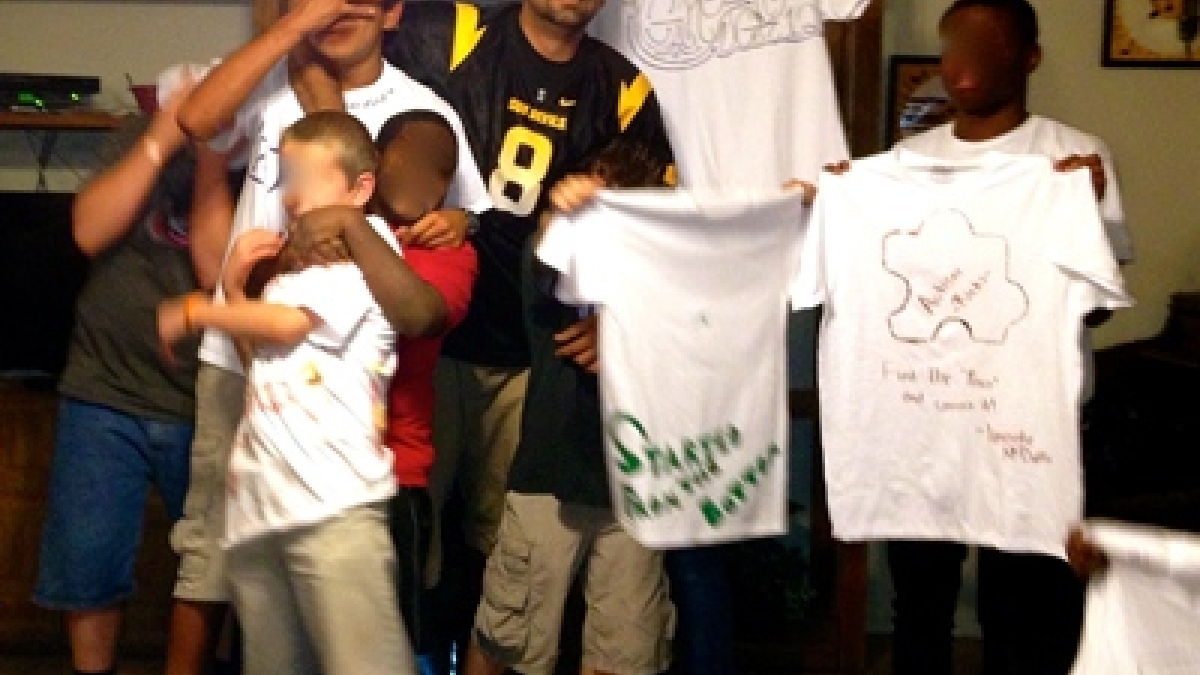Criminology student earns mentor award

School of Criminology and Criminal Justice doctoral student Gabriel Cesar received the "Free to Inspire 2013" mentor award at a recent volunteer appreciation event for Free Arts of Arizona. Cesar volunteers every Saturday at a West Valley group home for boys ages six to 16 in foster care.
“For me, the Free to Inspire Award from Free Arts of Arizona means a lot,” said Cesar. “Because honestly, I have never really known if I was doing mentoring right.”
He is one of about 500 Free Arts volunteers that bring visual art, creative writing, music, theater and dance to abused, neglected and homeless children living in more than 100 group homes, treatment centers and shelters in Maricopa County. The goal is to build trust, social skills and improve the self esteem of children that have few reasons to feel confident.
Working on arts and crafts projects, like building piñatas or decorating t-shirts, Cesar provides a creative outlet for their energy. He’s also taught the boys - who he calls “group homies” - how to plan and make basic meals, and bakes cakes and cupcakes with them for birthdays. He uses the occasions to get the boys to open up about their families and show them that men can cook, too.
“I never pictured myself being a role model for kids,” Cesar said. “Last I remember, I was a scared kid myself. I certainly do not have all the answers for the boys I work with, but what any kid needs most is for someone to just pay attention to them. Having incarcerated or deported parents, living through abuse and neglect, or being young and alone does not change that the way you might think.”
Cesar began volunteering three years ago after he graduated with his bachelor’s degree in criminology and criminal justice from Arizona State University. Cesar went on to earn a master’s degree, and is now a second-year doctoral student in the ASU School of Criminology and Criminal Justice. He spends three to four hours every Saturday at the group home. He’s also there for birthdays, holidays and special occasions – like graduations.
One of the first things a new kid will ask Cesar is how much he gets paid to come see them. As a criminologist who has studied post-incarceration programming with professor Kevin Wright, Cesar said he’s happy to tell them that he doesn't get paid at all.
“I generally joke that they could never pay me enough to put up with all those crazy kids,” Cesar said. “I make sure the boys I mentor know that the only reason I would come every week, toting art supplies or cooking ingredients – or my infamous stack of poetry/story/description journals – is because I care about them. And I would never want a scared kid to have to be all alone in the world.”
Cesar can relate to many of the issues the boys go through. School always came easy, but growing up in Detroit, he got into enough trouble to get kicked out of high school. And if his street cred is not enough, there is always Cesar’s large stature, clever wit and deep raspy voice, which can be intimidating - at least, at first. What they find is a trusting adult who lets them be kids.
“A lot of the time I am just horse-playing with the boys, or listening to their stories about school, or girls, or whatever,” Cesar said. “In the end, I’m just being myself, and the kids respond to that.”
Carmen Trujillo has seen that first-hand as Cesar's mentorship partner. The criminology and criminal justice undergraduate student has volunteered with Cesar the past three years. She said the roughhousing is a release for the boys, giving them a way to deal with the stress they face as children living without their parents.
“Gabriel effortlessly holds these young men accountable for who they are as people that we all share space with,” said Trujillo. “In that respect, he makes them realize what they do matters, and they should look out for each other and others. He does this with sort of a ‘pass-it-on’ approach.”
Due to academic responsibilities, Cesar was unable to attend the awards ceremony to receive the Free to Inspire 2013 Award, but listened in by cell phone as one of his “group homies” accepted the award on his behalf.
“The young man that opened the door for us three years ago on our first day at the group home actually spoke on his behalf,” Trujillo said. “It was very touching, yet very 'manly,' which was fitting for Gabriel.”